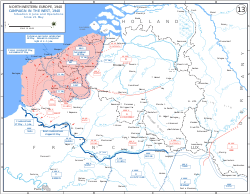
Back Belagerung von Calais (1940) German Calais’n piiritys Finnish Siège de Calais (1940) French Battaglia di Calais (1940) Italian カレー包囲戦 (1940年) Japanese Sètge de Calais (1940) Occitan Obrona Calais (1940) Polish Asediul orașului Calais (1940) Romanian Осада Кале (1940) Russian கலே முற்றுகை (1940) Tamil
| Siege of Calais (1940) | |||||||
|---|---|---|---|---|---|---|---|
| Part of The Battle of France | |||||||
 The Battle of France, situation 21 May – 4 June 1940 | |||||||
| |||||||
| Belligerents | |||||||
|
|
| ||||||
| Commanders and leaders | |||||||
|
|
| ||||||
| Strength | |||||||
|
c. 4,000 men 40 tanks | 1 panzer division | ||||||
| Casualties and losses | |||||||
|
POW: 3,500 British 16,000 French, Belgian and Dutch | |||||||
The siege of Calais (1940) was a battle for the port of Calais during the Battle of France. The siege was fought at the same time as the Battle of Boulogne, just before Operation Dynamo, the evacuation of the British Expeditionary Force (BEF) through Dunkirk. After the Franco-British counter-attack at the Battle of Arras (21 May), German units were held back to be ready to resist a resumption of the counter-attack on 22 May, despite the protests of General Heinz Guderian, the commander of the XIX Armee Korps, who wanted to rush north up the Channel coast to capture Boulogne, Calais and Dunkirk. An attack by part of the XIX Armee Korps was not authorised until 12:40 a.m. on the night of 21/22 May.
By the time the 10th Panzer Division was ready to attack Calais, the British 30th Infantry Brigade and 3rd Royal Tank Regiment (3rd RTR) had reinforced the French and British troops in the port. On 22 May, the British troops had established roadblocks outside the town and French rearguards skirmished with German armoured units, as they advanced towards Calais. British tanks and infantry had been ordered south to reinforce Boulogne but were too late. They then received orders to escort a food convoy to Dunkirk but found the road blocked by German troops. On 23 May, the British began to retire to the old Calais walls (built in the 1670s) and on 24 May, the siege began. The attacks by the 10th Panzer Division were mostly costly failures and by evening, the Germans reported that about half their tanks had been knocked out and a third of the infantry were casualties. The German attacks were supported by the Luftwaffe, while the Allied defenders were supported by their navies delivering supplies, evacuating wounded and bombarding German targets around the port.
On the night of 24/25 May, the defenders were forced to withdraw from the southern enceinte, to a line covering the Old Town and Citadel; attacks next day against this shorter line were repulsed. The Germans tried several times to persuade the garrison to surrender but orders had been received from London to hold out, because an evacuation had been forbidden by the French commander of the northern ports. More German attacks early on 26 May failed and the German commander was given an ultimatum that if Calais was not captured by 2:00 p.m., the attackers would be pulled back and the town levelled by the Luftwaffe. The Anglo-French defences began to collapse in the early afternoon and at 4:00 p.m. the order "every man for himself" was given to the defenders, as Le Tellier, the French commander surrendered. Next day, small naval craft entered the harbour and lifted about 400 men, while aircraft of the RAF and Fleet Air Arm dropped supplies and attacked German artillery emplacements.
In 1949, Churchill wrote that the defence of Calais delayed the German attack on Dunkirk, helping to save the 300,000 soldiers of the BEF, a claim that Guderian contradicted in 1951. In 1966, Lionel Ellis, the British official historian, wrote that three panzer divisions had been diverted by the defence of Boulogne and Calais, giving the Allies time to rush troops to close a gap west of Dunkirk. In 2006, Karl-Heinz Frieser wrote that the halt order issued to the German unit commanders because of the Anglo-French attack at the Battle of Arras (21 May) had a greater effect than the siege. Hitler and the higher German commanders panicked because of their fears of flank attacks, when the real danger was of the Allies retreating to the coast before they could be cut off. Reinforcements sent from Britain to Boulogne and Calais arrived in time to forestall the Germans and hold them off when they advanced again on 22 May.
© MMXXIII Rich X Search. We shall prevail. All rights reserved. Rich X Search
